Related Research Articles

Isaac Murphy was a native of Pennsylvania, a teacher and lawyer who moved to Fayetteville, Arkansas with his wife and child in 1834. He continued to teach and also became active in politics. Murphy is best known as the only delegate to have repeatedly voted against secession at the second Arkansas Secession Convention in 1861.
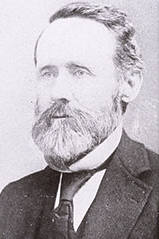
William Meade Fishback was a lawyer and politician who served as the 17th Governor of Arkansas from 1893 to 1895 and U.S. Senator-elect for Arkansas. He also served in the Arkansas House of Representatives. He was a Unionist and served in the Union Army. He was a delegate at Arkansas' 1874 Constitutional Convention.

Augustus Hill Garland was an American lawyer and Democratic politician from Arkansas, who initially opposed Arkansas' secession from the United States, but later served in both houses of the Congress of the Confederate States and the United States Senate, as well as becoming the 11th governor of Arkansas (1874–1877) and the 38th attorney general of the United States (1885–1889). He wrote several books.
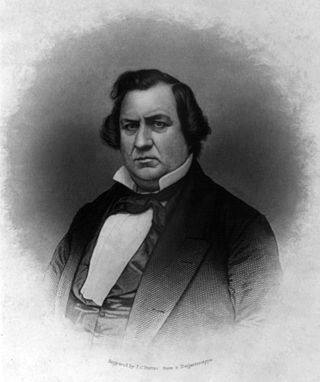
Herschel Vespasian Johnson was an American politician. He was the 41st Governor of Georgia from 1853 to 1857 and the vice presidential nominee of the Douglas wing of the Democratic Party in the 1860 U.S. presidential election. He also served as one of Georgia's Confederate States senators.

Alexander Hugh Holmes Stuart was a prominent Virginia lawyer and American political figure associated with several political parties. Stuart served in both houses of the Virginia General Assembly, as a U.S. Congressman (1841–1843), and as the Secretary of the Interior (1850–1853). Despite opposing Virginia's secession and holding no office after finishing his term in the Virginia Senate during the American Civil War, after the war he was denied a seat in Congress. Stuart led the Committee of Nine, which attempted to reverse the changes brought by Reconstruction. He also served as rector of the University of Virginia.

James Lawrence Pugh was a U.S. senator from Alabama, as well as a member of the Confederate Congress during the American Civil War.

Dewitt Clinton Senter was an American politician who served as the 18th Governor of Tennessee from 1869 to 1871. He had previously served in the Tennessee House of Representatives (1855–1861), where he opposed secession on the eve of the Civil War. He was elected to the Tennessee Senate following the war, and was chosen as Speaker of the Senate in 1867. As speaker, he became governor upon the resignation of William G. Brownlow in 1869.
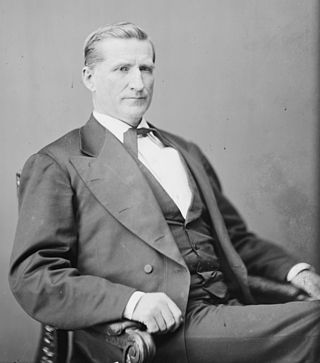
John Goode Jr. was a Virginia attorney and Democratic politician. He served in both the United States Congress and the Confederate Congress, and was a colonel in the Confederate Army. He was Solicitor General of the United States during the presidency of Grover Cleveland. He was known as "the grand old man of Virginia".

Jackson Morton was an American politician. A member of the Whig Party, he represented Florida as a U.S. Senator from 1849 to 1855. He also served as a Deputy from Florida to the Provisional Congress of the Confederate States from 1861 to 1862.
More than 1,500 African American officeholders served during the Reconstruction era (1865–1877) and in the years after Reconstruction before white supremacy, disenfranchisement, and the Democratic Party fully reasserted control in Southern states. Historian Canter Brown Jr. noted that in some states, such as Florida, the highest number of African Americans were elected or appointed to offices after the end of Reconstruction in 1877. The following is a partial list of notable African American officeholders from the end of the Civil War until before 1900. Dates listed are the year that a term states or the range of years served if multiple terms.
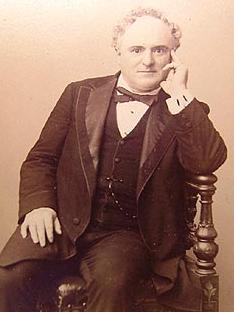
John R. Fellows was an American lawyer and politician from Arkansas and New York. He served as New York County District Attorney, and a member of Congress from New York (1891-1893).

John Curtiss Underwood was an attorney, abolitionist politician and a United States district judge of the United States District Court for the District of Virginia and the United States District Court for the Eastern District of Virginia.
James Barbour was a Virginia lawyer, planter, politician and Confederate officer. He represented Culpeper County, Virginia, in the Virginia General Assembly, as well as in the Virginia Constitutional Convention of 1850 and the Virginia secession convention of 1861. Barbour also served among Virginia's delegates to the 1860 Democratic National Convention, and as a major in the Confederate States Army during the American Civil War.
Hugh French Thomason was an American politician who served as Arkansas state representative from Crawford County from 1887 to 1889 and as Arkansas state senator from 1881 to 1885. He previously served in the Provisional Congress of the Confederate States representing Arkansas from 1861 to 1862.

John Lawrence Marye Jr., was a Virginia lawyer, plantation owner, Confederate soldier and politician. He served in the Virginia House of Delegates during the American Civil War, and upon the legislature's election of Lt. Gov. John F. Lewis as one of Virginia's U.S. Senators following the Commonwealth's readmission to the Union, was elected the tenth Lieutenant Governor of Virginia (1870-1874) and as such presided over the Virginia Senate. Marye also represented Spotsylvania County in both the Virginia Secession Convention and the Virginia Constitutional Convention of 1868, when he was a leading opponent of Congressional Reconstruction.
Fleming Bowyer Miller was an American lawyer and politician who represented Botetourt County, Virginia in both houses of the Virginia General Assembly during three decades, including in the Virginia Senate following the American Civil War. He also served in the Virginia Constitutional Convention of 1829–1830, Virginia Constitutional Convention of 1850 and the Virginia Secession Convention of 1861.
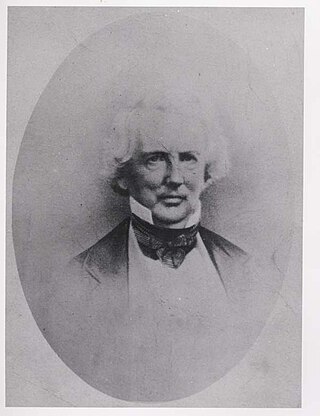
The Virginia Secession Convention of 1861 was called in the state capital of Richmond to determine whether Virginia would secede from the United States, govern the state during a state of emergency, and write a new Constitution for Virginia, which was subsequently voted down in a referendum under the Confederate Government.
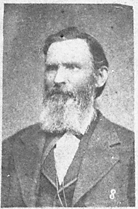
Bradley Bunch was a state legislator, judge, and historian in Arkansas. He served in the Arkansas House of Representatives and in the Arkansas Senate. He represented Carroll County, Arkansas in the 1885 Arkansas Senate. His post office was in Berryville, Arkansas. He was a Democrat.
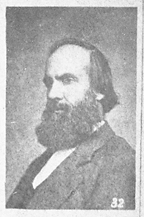
Xenophon Jacob Pindall Sr. was a lawyer, state legislator, and judge in Arkansas. He was a Lieutenant Colonel in the Missouri State Guard during the American Civil War.
Hector McNeil Grant was a doctor, councilman, mayor, and state legislator in Arkansas. He served in the Arkansas Senate. He owned a drugstore on First Street in Helena, Arkansas.
References
- 1 2 Senate, Arkansas General Assembly (December 11, 1870). "Journal of the Senate of Arkansas" – via Google Books.
- ↑ Bankes, T. (December 31, 1867). "1866-1867 Senate Memorial". Arkansas General Assembly Composite Images, 1866-2023.
- ↑ "Encyclopedia of Arkansas". Encyclopedia of Arkansas.
- 1 2 Representatives, Arkansas General Assembly House of (August 8, 1870). "Journal" – via Google Books.
- ↑ "Saline County in the Civil War". arkansascivilwar150.thesocialinnovation.net.
- ↑ "Encyclopedia of Arkansas". Encyclopedia of Arkansas.
- ↑ "Jabez M. Smith letter, 1861". Finding Aids. April 27, 2021.
- ↑ "Mississippi Official and Statistical Register". August 8, 1904 – via Google Books.